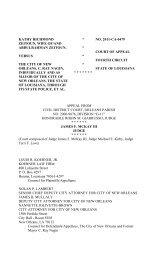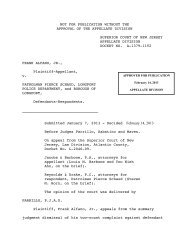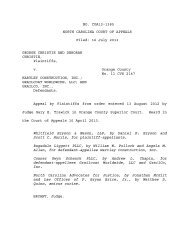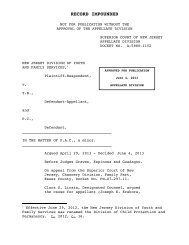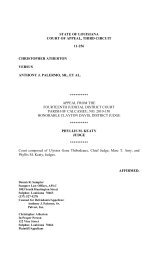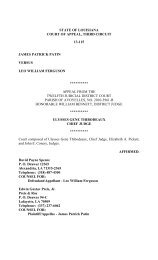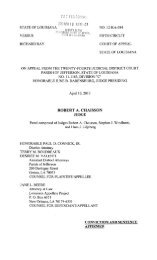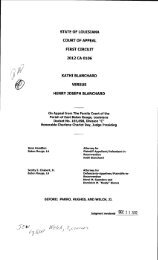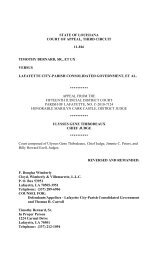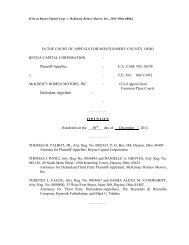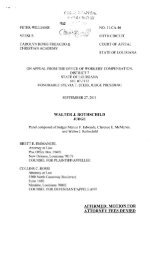state of louisiana court of appeal, third circuit 10-1253
state of louisiana court of appeal, third circuit 10-1253
state of louisiana court of appeal, third circuit 10-1253
You also want an ePaper? Increase the reach of your titles
YUMPU automatically turns print PDFs into web optimized ePapers that Google loves.
SAUNDERS, Judge.On January <strong>10</strong>, 2008, the State charged both Defendant, Brock AnthonyLafitte, and Darien James Greenwood with one count <strong>of</strong> armed robbery, in violation<strong>of</strong> La.R.S. 14:64, and one count <strong>of</strong> aggravated second degree battery, in violation <strong>of</strong>La.R.S. 14:34.7. On July 13, 2009, Defendant waived his right to a jury trial andmoved for a bench trial. At the conclusion <strong>of</strong> Defendant’s trial, the district <strong>court</strong>found Defendant guilty as charged. On February 5, 20<strong>10</strong>, the <strong>court</strong> orderedDefendant to serve ten years at hard labor for each conviction; designated that thearmed robbery sentence was to be served without probation, parole, or suspension <strong>of</strong>sentence; set forth that the penalties were to run concurrently; and gave Defendantcredit for time served.Defendant now <strong>appeal</strong>s. We affirm.STATEMENT OF FACTS:At trial, Thomas Cass first testified for the State. Mr. Cass was deer huntingwith his son in the Kisatchie National Forest around dawn on October 20, 2007, whenhe encountered Josh Pilcher, the victim. Mr. Cass observed that Mr. Pilcherseemingly had been severely beaten, as he was covered in dried blood and mud. Mr.Cass gave Mr. Pilcher a ride in his truck to seek medical attention.Mr. Cass related what Mr. Pilcher told him about what happened. On the priorThursday evening, Mr. Pilcher loaned his cell phone to two men, but they did notreturn it. After calling the number all day Friday, he finally spoke to them. The twomen arranged to meet with Mr. Pilcher near where Mr. Cass went hunting. When Mr.Pilcher arrived, the two men jumped him, beat him, stole his wallet and keys, andplaced him in the back <strong>of</strong> the truck. The men took turns driving and beating the man.After driving for a period <strong>of</strong> time, they pulled over and threw him into a ditch and
the[m] by the name <strong>of</strong> Darien, is what he had said. They were -- hadtold him that they were in the military. Darien had accused one <strong>of</strong> thepersons with Josh <strong>of</strong> taking his cell phone. He lost his cell phone at theclub. They -- there were some attempts to find the cell phone. Josh hadtold me that he loaned Darien his phone to try to call the lost phone tosee if they could locate it. That never happened at GG’s. Josh advisedthat Darien and the other person that was with Darien left GG’s with hiscell phone. He contacted them using his wife’s cell phone. He calledhis own cell phone that Darien had, the guy he was calling Darien, andhad made arrangements to meet them to get his cell phone back. Joshsays that that [sic] was going to be on Messina Road. He told me thathe went out to Messina Road. When he arrived[,] . . . the person heknew as Darien was in the passenger seat and another male was driving. . . . He says he got -- they were parked parallel. He says he got out <strong>of</strong>his vehicle, asked for his phone. The passenger told him he wasn’tgetting his phone. He said the guy that he knew as Darien got out,produced a rifle, which Josh believed to be an AK-47. He said he shota round -- pointed it at him and then shot a round at his feet into theground. He said during this, he said the driver got out and came aroundthe truck. And I believe in his <strong>state</strong>ment he said that they double-teamedhim. He said he -- he fell to the ground. The -- the unidentified male atthe time got on top <strong>of</strong> him, was yelling at him, cussing at him. Josh saidhe hit him, he struck him a few times, hit him. There was talk about himhaving a pistol, that he -- he said he had a Glock and he was going toshoot him, things like that. During that same time, Darien, the oneidentified as Darien at the time, came back on top <strong>of</strong> him with the otherperson, Darien was questioning him pretty strongly about the cell phone-- where’s the cell phone. And when Josh would say, I don’t knowwhere your cell phone is, the one he knew as Darien would -- would stabhim in his hand. Josh said that they had him pinned down flat, one armbehind his back and the other arm stretched out on the -- on the gravelroad. He said at some point when they both -- when they both was [sic]<strong>of</strong>f <strong>of</strong> him, that’s when he was able to run <strong>of</strong>f into the woods. And hestayed there until he -- I guess the next morning, when he was walkingthrough the woods and came across a hunter.Detective Reed said that, at the hospital, Mr. Pilcher had knife wounds to hishand and a laceration on his head. Mr. Pilcher reported being in a lot <strong>of</strong> pain. Duringhis interview with Mr. Pilcher, Detective Reed learned that Mr. Pilcher had beenrobbed as well as beaten. Mr. Pilcher’s wallet and cell phone had been taken.After speaking with Mr. Pilcher, Detective Reed also went to the scene <strong>of</strong> the<strong>of</strong>fenses. Mr. Pilcher’s truck was still parked on the road near the scene <strong>of</strong> the3
incident. Detective Reed observed while Detective Weatherford processed the scene.Detective Reed then obtained information through Mr. Pilcher’s wife. Mrs. Pilcherhad access to the cell phone bill, so she printed out a copy, which showed thenumbers called by Mr. Pilcher’s cell phone during the early morning hours <strong>of</strong> thetwentieth. Detective Reed was able to call the numbers to find out who had beencalling them from Mr. Pilcher’s phone.Detective Reed related that one <strong>of</strong> the calls was to Olivia West, who said herboyfriend, Darien Greenwood, had called her to say he lost his cell phone at a nightclub. Ms. West gave Detective Reed information on Mr. Greenwood and <strong>state</strong>d shewas unable to contact him during the day because he was attending a military school.Detective Reed then put Mr. Greenwood into a lineup and showed it to Mr. Pilcher;Mr. Pilcher identified Mr. Greenwood as the man he knew as “Darien.”Detective Reed said that two days later he was contacted by a master sergeantfrom the Air National Guard as a result <strong>of</strong> a call from Defendant. Defendant hadinformed the master sergeant that he had knowledge <strong>of</strong> the incident. Detective Reedmet with both the master sergeant and Defendant at Defendant’s residence.Defendant was cooperative, and, after being read his rights, he consented to a searchand gave a <strong>state</strong>ment.Detective Reed recalled that Defendant reported to having a role in the incident<strong>of</strong> protecting Mr. Pilcher, rather than harming him. Detective Reed did notimmediately arrest Defendant because he wanted to consult Mr. Pilcher about thecontents <strong>of</strong> Defendant’s <strong>state</strong>ment.In his <strong>state</strong>ment, Defendant <strong>state</strong>d that at GG’s he and Mr. Greenwood met Mr.Pilcher and four Mexican contractors. Defendant discussed his plans with Mr. Pilcher4
to later go out to Kisatchie, have a bonfire, drink, and shoot guns. Defendantcontinued that an incident involving Mr. Greenwood’s cell phone happened at GG’s:The Mexicans were in a separate vehicle other than Josh and they leftlike about...they left about the same time we did except they weretaunting Darren because Darren called...used my cell phone to call theMexicans’ phones and I think it was Roberto or Richard, one <strong>of</strong> the guysin the truck that he called and he knew they had their cell phone becausehe could hear the music in the background. At that moment Josh..heunderstood everything and he understood the situation very well and heproceeded to give...he gave Darren his cell phone, his personal cellphone and said hey, I’m gonna call you from my wife’s phone. I havemy wife’s phone, here you go, this is a good gesture. I’m gonna go findout what’s wrong with them but I still wanta meet up with you guyscause I wanta hang out. I’m sorry that happened but we still wanta godrink beer and go have fun.Defendant then invited Mr. Pilcher to Kisatchie. Defendant did not want thecontractors to attend because he was afraid <strong>of</strong> further conversation between them andMr. Greenwood though Mr. Greenwood seemed to have calmed down. WhenDefendant and Mr. Greenwood met Mr. Pilcher at Kisatchie, Mr. Pilcher got out <strong>of</strong>his vehicle. When Mr. Greenwood asked where his cell phone was, Mr. Pilcher saidhe had looked for it, but he was unable to locate the phone, so he did not have it.Defendant then stepped outside to relieve himself, and related that, when he turnedback toward the truck, Mr. Greenwood had pointed Defendant’s SKS at Mr. Pilcherand fired a single shot into the ground. Defendant said he put himself between thetwo men, and ended up knocking Mr. Pilcher to the ground because he wanted tocover Mr. Pilcher with his body. Mr. Greenwood continued to taunt Mr. Pilcher withthe gun, and Defendant kept pushing the barrel away from Mr. Pilcher. Defendantrecalled Mr. Pilcher being scared, but he did not know if Mr. Pilcher attempted to getaway or told Defendant to let him up, as Defendant was also afraid.5
Defendant then said that, after firing the initial shot, Mr. Greenwood had “buttstroked” Mr. Pilcher onto the ground. Defendant dragged Mr. Pilcher to the front <strong>of</strong>the vehicles to protect him from shots fired down range. Eventually, Mr. Greenwoodhanded Defendant the rifle; Defendant unloaded it and placed the shells in his pocket.Defendant went to back to his truck. When he returned, Mr. Greenwood was on top<strong>of</strong> Mr. Pilcher with a knife and had already cut Mr. Pilcher on the forehead.Defendant said he demanded that Mr. Greenwood get <strong>of</strong>f <strong>of</strong> Mr. Pilcher, and hepleaded with Mr. Pilcher to tell Mr. Greenwood what he wanted to know.Defendant said that Mr. Greenwood instructed him to grab Mr. Pilcher’s wallet,and Defendant obeyed. Defendant was on Mr. Pilcher, as Mr. Greenwood continuedto interrogate Mr. Pilcher about the cell phone. Mr. Greenwood stabbed Mr. Pilcherin the hand multiple times. Defendant, covered in blood, tried to stop Mr.Greenwood, but he did not want to get hurt. Defendant repeatedly told Mr.Greenwood to stop. Mr. Greenwood then mentioned that they could not leave Mr.Pilcher there, and they had to get rid <strong>of</strong> him. Defendant refused, got <strong>of</strong>f <strong>of</strong> Mr.Pilcher, and walked to his truck. Mr. Greenwood took the keys from Mr. Pilcher’struck and kept them and the identification from Mr. Pilcher’s wallet. Defendant didnot know what Mr. Greenwood did with the actual wallet.Defendant maintained that he had done things he should not have because Mr.Greenwood threatened him. Defendant said he told Mr. Pilcher it would stop if hegave Mr. Greenwood back his cell phone. Defendant denied ever hitting Mr. Pilcher,shooting at Mr. Pilcher, or stabbing him. Defendant only held him down and took hiswallet. Defendant distracted Mr. Greenwood in the hope that Mr. Pilcher would flee.Mr. Greenwood said they had to kill Mr. Pilcher. After Mr. Pilcher ran away, Mr.6
Greenwood insisted they find him and went walking in the woods. On the way backto Defendant’s house, Mr. Greenwood told Defendant to not say anything about theincident. The last time Defendant saw Mr. Greenwood, Mr. Greenwood said he wasgoing to get rid <strong>of</strong> the evidence.The next morning, Defendant informed his roommate, a neighbor, and a familyfriend who was a corrections <strong>of</strong>ficer about what had happened. Eventually,Defendant also notified his superiors in the military.After the introduction <strong>of</strong> Defendant’s <strong>state</strong>ment, Detective Reed resumedtestifying. He talked to Mr. Pilcher about Defendant’s <strong>state</strong>ment before arrestingDefendant for armed robbery and second degree aggravated battery.On cross-examination, Detective Reed agreed that Mr. Pilcher had told him thatDefendant pulled him in front <strong>of</strong> the truck and covered him. Mr. Pilcher also relatedto Detective Reed that Mr. Greenwood had held the knife to Mr. Pilcher’s ear andthreatened to cut it <strong>of</strong>f. Mr. Pilcher said Mr. Greenwood took his wallet containingten dollars and the cell phone. He also set forth that Defendant told Mr. Greenwoodto stop and leave Mr. Pilcher alone. At the time he wrote the affidavit for the arrestwarrant for Mr. Greenwood, Detective Reed had not had an opportunity to discussDefendant’s <strong>state</strong>ment with Mr. Pilcher in detail.Detective Reed said, when he spoke with Mr. Pilcher, Mr Pilcher let him knowthat he never felt as if Defendant was trying to protect him. Mr. Pilcher added thatDefendant was very vocal and voiced threats during the entire incident. DetectiveReed wrote an affidavit in support <strong>of</strong> an arrest warrant for Defendant a week after hewrote the one for Mr. Greenwood. The account varies from the first arrest warrantaffidavit. The primary difference is that in the first affidavit, Detective Reed affirmed7
that Defendant covered Mr. Pilcher; in the second, Detective Reed wrote thatDefendant held Mr. Pilcher down.On redirect examination, Detective Reed said he wrote the affidavit in support<strong>of</strong> arresting Mr. Greenwood after speaking to Defendant, and he issued the affidavitsupporting the arrest <strong>of</strong> Defendant after he discussed Defendant’s <strong>state</strong>ment with Mr.Pilcher. The additional information required the corrections to the informationcontained in the first affidavit.The State’s sixth witness was the victim, Mr. Pilcher. In 2007, he was workingfor a landscaping company in Alexandria. He went out with a friend and somecoworkers the Friday night before October 20, 2007. He and his companionseventually went to GG’s where he spent most <strong>of</strong> the evening playing pool with afriend.Mr. Pilcher said his friend Roberto was the first person who started talking toDefendant and Mr. Greenwood. Mr. Pilcher entered the conversation, and theyseemed to “hit it <strong>of</strong>f.” Mr. Pilcher and the two men exchanged names and cell phonenumbers. Near closing time, Mr. Greenwood realized his cell phone was missing, soMr. Pilcher allowed Mr. Greenwood to use his cell phone to call the lost phone.Mr. Pilcher testified he went to his vehicle in the parking lot, and he sawDefendant and Mr. Greenwood leaving in a black truck. Mr. Pilcher related that hehad his wife’s cell phone in his truck. Mr. Pilcher used his wife’s phone to call hiscell number and ask for his phone back. The men told him where to meet them, sohe went to meet Defendant and Mr. Greenwood to retrieve his phone.Mr. Pilcher explained that when he arrived at the designated location, he sawthe black truck parked in the middle <strong>of</strong> the road, so he “pulled up” to within five feet,8
turned <strong>of</strong>f his engine, and exited his vehicle. Mr. Pilcher went to the window <strong>of</strong> theother truck and asked for his phone. Mr. Greenwood said Mr. Pilcher would notreceive his phone until Mr. Greenwood’s was returned. Mr. Pilcher protested that hedid not have Mr. Greenwood’s phone and that Mr. Greenwood was accusing thewrong person <strong>of</strong> having the device. Mr. Greenwood, who had an assault rifle acrosshis lap, then pointed it at Mr. Pilcher. Defendant pushed it down and instructed Mr.Greenwood to not shoot inside the truck. Mr. Greenwood exited the truck and walkedaround to where Mr. Pilcher was standing.Mr. Pilcher explained that Mr. Greenwood began yelling at him and asking forhis cell phone. When Mr. Pilcher maintained he did not have the phone, Mr.Greenwood put the barrel <strong>of</strong> the rifle in Mr. Pilcher’s face. In response, Mr. Pilcherpushed down on the barrel. Mr. Greenwood then stepped back and fired the riflebetween Mr. Pilcher’s feet. Mr. Pilcher became frightened and ran around the rear<strong>of</strong> the truck, as Mr. Greenwood followed. Mr. Pilcher stopped, turned back, andgrabbed the rifle. A struggle ensued between Mr. Pilcher and Mr. Greenwood untilDefendant struck Mr. Pilcher from behind, placed him in a chokehold, and held apistol to his head.Once Mr. Pilcher was in the chokehold, he stopped fighting over the weapon.Defendant then placed Mr. Pilcher into a wristlock and maneuvered him into aposition where he was facedown on the ground. Mr. Pilcher was immobilized fromthe excruciating pain <strong>of</strong> the wristlock. Defendant knelt on Mr. Pilcher’s back andplaced one knee on his neck and the other in a position to maintain the wristlock.Defendant also put a hand on Mr. Pilcher’s back.9
Mr. Pilcher said that while Defendant was still holding him to the ground, Mr.Greenwood walked around and kicked Mr. Pilcher in the face. Defendant theninstructed Mr. Greenwood to retrieve a knife from the truck. Thereafter, every timeMr. Pilcher cried, whimpered, or denied having the cell phone, he felt a blow on hishand. At the time, he did not know he was being stabbed, because his face wasturned away from where the men were holding his hand. During this phase <strong>of</strong> theattack, Defendant shifted to sit on Mr. Pilcher’s back. Mr. Pilcher thought it wasDefendant who was damaging his hand because he could see Mr. Greenwoodstanding to his right, within his field <strong>of</strong> vision. Mr. Pilcher did not hear either manattempt to aid him, and neither man <strong>of</strong>fered any reassuring words.Mr. Pilcher recalled Defendant removing Mr. Pilcher’s wallet from his backpocket. After taking Mr. Pilcher’s wallet, Defendant threatened that, after they werefinished with Mr. Pilcher, they would do the same things to Mrs. Pilcher. Mr. Pilcherthought the men might have seen the photograph <strong>of</strong> his wife that he used as abackground on his cell phone screen. Besides the injuries to his hand, Mr. Pilcherhad a cut on his right pinky finger and a long slit on his forehead, which had beeninflicted when Defendant, who was sitting on Mr. Pilcher’s back, pulled back Mr.Pilcher’s head and sliced him with the knife across the forehead.Mr. Pilcher related that, as Defendant punctured Mr. Pilcher’s neck with theknife and insisted that he was going to cut <strong>of</strong>f Mr. Pilcher’s ear, Mr. Greenwoodapproached and <strong>state</strong>d that he thought he heard a car nearby. The two men “freakedout” and let Mr. Pilcher sit up while they prepared to move both trucks out <strong>of</strong> theroad. Before they walked <strong>of</strong>f, Mr. Greenwood reared back and struck Mr. Pilcher onthe forehead with the rifle. Mr. Pilcher laid down and rolled over onto his side at the<strong>10</strong>
edge <strong>of</strong> the ditch. When Mr. Pilcher heard his truck crank, he sprang to his feet andran <strong>of</strong>f into the woods.Exhausted, Mr. Pilcher stopped running and took refuge in some bushes by afallen tree. Mr. Pilcher stayed by the tree until he saw daylight. When it was lightenough for him to see, he started working his way toward the highway. En route tothe road, he encountered a deer hunter, Mr. Cass, out with his son, so Mr. Pilcherstarted crying and calling for help. Mr. Cass then drove Mr. Pilcher to a localhospital.Detective Reed took a <strong>state</strong>ment from him at the hospital. Mr. Pilcher thoughthe probably did not give Detective Reed a complete <strong>state</strong>ment at the time because hewas traumatized and embarrassed about some <strong>of</strong> the details because his wife was inthe room.Thomas Normand, with the Rapides Parish Sheriff’s Office, was the firstwitness to testify for the defense. Deputy Normand received a call from Defendantaround 5:00 a.m. on the morning <strong>of</strong> October 20, 2007. Defendant told DeputyNormand that he had witnessed a fight and was worried that it would affect his job.Deputy Normand went to Defendant’s house a couple <strong>of</strong> days after the call, and,while there, spoke to Defendant, who denied being involved in the beating. DeputyNormand did not recall Defendant saying he tried to help the victim, but he didremember Defendant saying that he had not tried to hurt the man. On crossexamination,Deputy Normand explained that Defendant did not ask him to involveemergency services, that Defendant did not tell him they left the man hurt in thewoods, and that Defendant did not mention a robbery or a stabbing. The purpose <strong>of</strong>Defendant’s call to Deputy Normand did not include seeking assistance for Mr.11
Pilcher. Over the telephone, Defendant sounded nervous, confused, disoriented,freaked out, and possibly drunk. Defendant was primarily worried that he would getinto trouble.Dr. John C. Simoneaux, an expert in forensic psychology, was another witnessfor the defense. Dr. Simoneaux examined the medical records in the instant case andthe report prepared by Dr. Lonowski, an expert in clinical and forensic psychology.Dr. Simoneaux also interviewed and tested Defendant. Dr. Simoneaux agreed withDr. Lonowski’s diagnosis that Defendant suffered from post-traumatic stress disorder(“PTSD”), major depression, and alcoholism. Defendant reported to Dr. Simoneauxthat he took protective action for both himself and the victim during the incident.Although Dr. Simoneaux could not tell whether Defendant’s account was truthful, itseemed to be credible because it was fairly consistent. Dr. Simoneaux concludedDefendant’s judgment was impaired by extreme intoxication. Although the incidentprovoked anxiety, Defendant’s acute recall <strong>of</strong> the incident showed there was nodisassociation. Dr. Simoneaux read his conclusion:the incident in question was a very anxiety provoking event, but it did. . . not . . . put Brock in a position where he was unaware <strong>of</strong> thewrongfulness <strong>of</strong> his acts. At the time <strong>of</strong> the alleged <strong>of</strong>fense[,] Brockdetailed various actions that he took that suggest[ed] very clearly heunderstood the situation he was in even though he was anxious andintoxicated, he took protective actions for both himself and others.On cross-examination, Dr. Simoneaux maintained that the incident did not putDefendant in a position where he was unaware <strong>of</strong> the wrongness <strong>of</strong> his actions. Dr.Simoneaux did not believe that Defendant had a psychotic disassociative episode.Defendant was certainly not psychotic and knew that the events constituted criminalactivity. The actions Defendant described himself as taking were almost heroic. Heclearly knew right from wrong at the time. This conclusion was supported by the12
actions Defendant took that showed he was aware <strong>of</strong> the matter’s legal implications.His lack <strong>of</strong> judgment seemed to arise more from his voluntary intoxication than hisPTSD.Defendant then testified in his own defense. Defendant enlisted in the AirNational Guard in 2003, and he was activated to duty during Hurricane Katrina in2005. After Hurricane Katrina, he was <strong>of</strong>fered an active duty position in the GuardReserve for the Louisiana International Guard in Alexandria.Defendant said he had been shot at during his deployment for HurricaneKatrina and was considered a disabled veteran because <strong>of</strong> his PTSD. Defendantstarted drinking heavily after Hurricane Katrina, and since then, he sought treatmentfor his alcohol problem. Defendant had been confined to three different hospitals onthree different occasions since the incident.Defendant said he met Mr. Greenwood either the evening <strong>of</strong> the incident or theday before. Defendant’s first impression <strong>of</strong> Mr. Greenwood was that Mr. Greenwoodwas a good guy, so they decided to go out together and ended up at GG’s Club wherethey met Mr. Pilcher. Defendant was intoxicated. Defendant, Mr. Greenwood, andMr. Pilcher conversed about guns and video games. Defendant and Mr. Greenwooddrunkenly argued about who was a better shot, so they decided to go shoot guns inthe woods later that evening. Mr. Pilcher planned to follow them there.Defendant said that, around closing time, Mr. Greenwood realized he lost hiscell phone. At first, Mr. Greenwood was upset, but it was not “too dramatic.”Defendant let Mr. Greenwood borrow his phone to call the lost device.Defendant explained that they then went to Messina Road in the KisatchieNational Forest where they waited for Mr. Pilcher. Defendant said that after Mr.13
Pilcher stopped in the road, he exited his truck and walked toward the driver’s side<strong>of</strong> Defendant’s vehicle. Mr. Greenwood asked Mr. Pilcher about the missing phonewhile Defendant exited his truck. Defendant <strong>state</strong>d that he then walked in front <strong>of</strong>Mr. Pilcher’s truck to “use the bathroom” and smoke a cigarette. Mr. Pilcher and Mr.Greenwood talked while Defendant was otherwise occupied. Defendant heard agunshot and dropped to the ground. When he stood back up and turned around,Defendant saw Mr. Greenwood aiming a smoking rifle barrel in his and Mr. Pilcher’sdirection. Defendant responded by inserting himself between Mr. Pilcher and Mr.Greenwood and taking Mr. Pilcher “into cover.” This entailed forcing Mr. Pilcher tothe front <strong>of</strong> Mr. Pilcher’s vehicle and falling on top <strong>of</strong> him. Defendant asserted that,before he reached Mr. Pilcher, Mr. Greenwood struck Mr. Pilcher in the head with agun.Defendant recounted that the situation then calmed down. Mr. Greenwoodhanded Defendant the rifle. Defendant immediately unloaded the firearm. Hethought the incident was over, so he stood up and returned the rifle to his truck.When he turned around, he saw Mr. Greenwood on top <strong>of</strong> Mr. Pilcher. Defendantthen observed Mr. Greenwood cut Mr. Pilcher’s head and stab him around his ear andeye. Defendant continued that he ran toward the pair, pushed Mr. Greenwood <strong>of</strong>f Mr.Pilcher, and put his own body back on top <strong>of</strong> Mr. Pilcher.Defendant related that Mr. Greenwood returned with the rifle and held it overboth Defendant’s and Mr. Pilcher’s heads. Mr. Greenwood instructed Defendant togive him Mr. Pilcher’s wallet, and Defendant complied. Defendant pr<strong>of</strong>essed that hetook Mr. Pilcher’s wallet because he feared for his own life:While the weapon was being pointed, it was being pointed at both <strong>of</strong> us,because he was waving it over our heads, because Josh was laid down14
and I was laid down on top <strong>of</strong> him. And at that moment, I felt that I wasin fear <strong>of</strong> my own life as well, because . . . I was scared and I had noidea . . . who this guy was, like who Greenwood was. I mean, I knewhim for a day[.]Defendant said Mr. Greenwood suddenly stopped what he was doing andwalked away. Defendant followed him and found Mr. Greenwood talking on a cellphone on the other side <strong>of</strong> Defendant’s vehicle. Defendant took the weapon from Mr.Greenwood, put it back in his truck, and told Mr. Greenwood to leave Mr. Pilcheralone. Mr. Pilcher ran away, and Mr. Greenwood pursued. Mr. Greenwood also fireda couple <strong>of</strong> shots after Mr. Pilcher. Though Mr. Greenwood <strong>state</strong>d and re<strong>state</strong>d thatthey had to kill Mr. Pilcher, Defendant insisted they leave, so they left after Mr.Greenwood wiped down the interior <strong>of</strong> the truck. Once he reached his home, hecalled Thomas Normand, who worked as a corrections <strong>of</strong>ficer for the Rapides ParishSheriff’s Office.Finally, Defendant maintained that his actions had been designed to protect Mr.Pilcher and himself. They had not been designed to harm Mr. Pilcher. Defendant feltas if he were also in danger.On cross-examination, Defendant agreed that there was a time during theincident after Mr. Greenwood handed him the rifle where Defendant was holding itwhile Mr. Greenwood was unarmed. Defendant also knew that Mr. Pilcher’s life wasin danger while Mr. Greenwood had the rifle, but he felt that the danger passed onceDefendant obtained possession <strong>of</strong> the weapon and unloaded it. Defendant blamed hisintoxication for his failure to use the loaded rifle to take charge <strong>of</strong> the situation aswell as for his failure to get <strong>of</strong>f <strong>of</strong> Mr. Pilcher at the time in order to allow Mr. Pilcherto escape. Defendant said he thought Mr. Pilcher was a liar and had lied about15
Defendant’s involvement in the <strong>of</strong>fenses. Defendant did not know what wouldmotivate Mr. Pilcher to lie at trial.Dr. Daniel Lonowski next appeared as a defense witness. Dr. Lonowski opinedthat Defendant suffered from PTSD as well as alcohol dependence arising from hisattempts to cope with the symptoms <strong>of</strong> PTSD and depression.Dr. Lonowski related that Defendant had given him a clear, concise, andconsistent account <strong>of</strong> what had happened on the evening <strong>of</strong> the incident. Defendant<strong>state</strong>d that he had acted to protect Mr. Pilcher. Defendant never deviated from theconcept <strong>of</strong> protection. Dr. Lonowski explained that he had never before seen or heard<strong>of</strong> a report where the cruel and vicious behavior exhibited during the <strong>of</strong>fenses wasattributed to Defendant, so his findings were based solely on Defendant’s account thathe was acting to protect Mr. Pilcher. In addition to the alcoholism and PTSD, Dr.Lonowski found Defendant had a diminished capacity to make reasoned decisions.Dr. Lonowski thought Defendant only developed an understanding <strong>of</strong> wrongdoingafter the fact.On cross-examination, Dr. Lonowski explained that he did not think Defendanthad criminal intent during the <strong>of</strong>fenses though Defendant behaved in a criminalmanner by putting his hands on the victim and restraining him. Dr. Lonowskireiterated that he did not think Defendant had an awareness that his actions could beconstrued as wrong until after the fact. Defendant felt he was doing the right thingat the time.Mr. Pilcher was called to testify in rebuttal. Mr. Pilcher asserted he had noreason to lie against Defendant. He had never met Defendant before, and no one hadthreatened or intimidated him into giving his testimony. Mr. Pilcher maintained that16
Defendant was the person who robbed him, cut him, hit him, and cursed him. Mr.Pilcher heard Defendant’s testimony and recognized his voice from the night <strong>of</strong> thecrimes. While Mr. Pilcher was lying on the ground whimpering and crying,Defendant leaned down and threatened to kill him if he did not “shut up.”Mr. Pilcher declared that he had been as truthful as he possibly could:I’m telling you everything as well as I can remember how it went down.I mean, there’s details that I know I probably forgot to mention, orthere’s details that know I’ve mentioned that I forgot to mention in myreport -- in the -- in the report to the <strong>of</strong>ficers. But everything that I’mtelling right now is, I mean, is truth and has always been the truth.On February 1, 20<strong>10</strong>, the trial <strong>court</strong> found Defendant guilty as charged withoutissuing reasons for its ruling.ERRORS PATENT:In accordance with La.Code Crim.P. art. 920, all <strong>appeal</strong>s are reviewed by this<strong>court</strong> for errors patent on the face <strong>of</strong> the record. After reviewing the record, we findthat there are no errors patent; however, the sentencing minutes require correction.The sentencing minutes indicate Defendant’s ten-year sentence for aggravatedsecond degree battery was imposed without benefit <strong>of</strong> parole, probation, orsuspension <strong>of</strong> sentence; however, the sentencing transcript contains no suchrestriction on benefits. When the transcript and <strong>court</strong> minutes conflict, the transcriptprevails. State v. Colton, 07-252 (La.App. 3 Cir. <strong>10</strong>/31/07), 968 So.2d 1239, writdenied, 07-2296 (La. 4/25/08), 978 So.2d 364. Additionally, we note that there is norestriction on benefits required by La.R.S. 14:34.7. Thus, the trial <strong>court</strong> is instructedto delete the provision in the sentencing minutes which <strong>state</strong>s that Defendant’ssentence is to be without benefit <strong>of</strong> parole, probation, or suspension <strong>of</strong> sentence.17
DISCUSSION:Defendant argues, “[t]he trial <strong>court</strong> erred in finding that the evidence wassufficient to prove the defendant was guilty.” Defendant urges that the State failedto satisfy its burden <strong>of</strong> proving general criminal intent to commit the armed robberyand specific criminal intent to commit the aggravated second degree battery.Defendant maintains that the evidence shows he acted only to protect the victim.Therefore, Defendant asserts his actions were justified based upon his subjectivebelief that he was acting to protect both the victim and himself.In his second assignment <strong>of</strong> error, Defendant asserts, “[t]he trial <strong>court</strong> erred inrejecting uncontradicted expert testimony as to the issues <strong>of</strong> intent and justificationas a defense.” Defendant adds that the uncontested testimony <strong>of</strong> the defense’spsychological experts successfully refuted any inference <strong>of</strong> criminal intent.Defendant maintains that the evidence shows he acted only to protect the victim.The State responds that Defendant’s actions were those <strong>of</strong> a full participant inthe <strong>of</strong>fenses rather than someone acting to protect the victim. The State asserts thatthe facts do not fit a justification or necessity defense. The State adds, moreover, thatthe facts support the trial <strong>court</strong>’s determination.CREDIBILITY DETERMINATIONS:Defendant argues that the trial <strong>court</strong> should have believed the testimonies givenby him and his psychologists over the account given by the victim in the matter. Itis not the function <strong>of</strong> the appellate <strong>court</strong> to reassess credibility <strong>of</strong> witnesses orreweigh evidence:[The supreme <strong>court</strong> has] repeatedly cautioned that due process, rationalfact finder test <strong>of</strong> Jackson v. Virginia, 443 U.S. 307, 99 S.Ct. 2781, 61L.Ed.2d 560 (1979), does not permit a reviewing <strong>court</strong> to substitute itsown appreciation <strong>of</strong> the evidence for that <strong>of</strong> the fact finder or to second18
guess the credibility determinations <strong>of</strong> the fact finder necessary to renderan honest verdict. A reviewing <strong>court</strong> may intrude on the plenarydiscretion <strong>of</strong> the fact finder “only to the extent necessary to guaranteethe fundamental protection <strong>of</strong> due process <strong>of</strong> law.”State v. Calloway, 07-2306, p. <strong>10</strong> (La. 1/21/09), 1 So.3d 417, 422 (citations omitted).“The trier <strong>of</strong> fact makes credibility determinations and may, within the bounds <strong>of</strong>rationality, accept or reject the testimony <strong>of</strong> any witness[.]” State v. Higgins,03-1980, p. 17 (La. 4/1/05), 898 So.2d 1219, 1232, cert. denied, 546 U.S. 883, 126S.Ct. 182 (2005). “Credibility determinations are within the sound discretion <strong>of</strong> thetrier <strong>of</strong> fact and will not be disturbed unless clearly contrary to the evidence.” Statev. Marshall, 04-3139, p. 9 (La. 11/29/06), 943 So.2d 362, 369, cert. denied, 552 U.S.905, 128 S.Ct. 239 (2007).Although there may have been some inconsistencies between Mr. Pilcher’sprior <strong>state</strong>ments and his testimony, Defendant’s report <strong>of</strong> the event also containeddiscrepancies. For example, Defendant asserted that, after he unloaded the firearmand returned it to the truck, Mr. Greenwood used the rifle to intimidate him intotaking Mr. Pilcher’s wallet. Defendant asserted he was afraid for his life, when hehad already removed the ammunition. Further, Mr. Pilcher had no motive to lie;however, Defendant’s freedom rested upon his ability to convince the trial <strong>court</strong> <strong>of</strong>his version <strong>of</strong> events. Both <strong>of</strong> the psychologists who testified at trial <strong>state</strong>d that theirconclusions had been based solely upon the account <strong>of</strong> events given by Defendantand did not include any other versions <strong>of</strong> the incident. Moreover, Dr. Simoneauxclearly expressed that Defendant knew the difference between right and wrong at thetime <strong>of</strong> the crimes.Defendant presented a justification defense by testifying that he acted only toprotect Mr. Pilcher, but the district <strong>court</strong> clearly did not believe Defendant. Instead,19
the trial <strong>court</strong> believed Mr. Pilcher’s version <strong>of</strong> events. Mr. Pilcher’s testimonyshowed that, rather than protecting Mr. Pilcher, Defendant was the person whocommitted the crimes while Mr. Greenwood stood nearby and occasionally assisted.As it is not clearly contrary to the evidence, the trial <strong>court</strong>’s credibility determinationwas within the bounds <strong>of</strong> rationality. Thus, the trial <strong>court</strong>’s finding <strong>of</strong> credibility didnot constitute an abuse <strong>of</strong> discretion.SUFFICIENCY OF THE EVIDENCE:The defense also asserts that the prosecution failed to meet its burden <strong>of</strong>proving Defendant committed the <strong>of</strong>fenses for which he was convicted. TheLouisiana Supreme Court has discussed the standard <strong>of</strong> review for evaluating thesufficiency <strong>of</strong> the evidence on <strong>appeal</strong>:The standard <strong>of</strong> appellate review for a sufficiency <strong>of</strong> the evidenceclaim is whether, after viewing the evidence in the light most favorableto the prosecution, any rational trier <strong>of</strong> fact could have found theessential elements <strong>of</strong> the crime proven beyond a reasonable doubt.Jackson v. Virginia, 443 U.S. 307, 319, 99 S.Ct. 2781, 2789, 61 L.Ed.2d560 (1979). A determination <strong>of</strong> the weight <strong>of</strong> evidence is a question <strong>of</strong>fact, resting solely with the trier <strong>of</strong> fact who may accept or reject, inwhole or in part, the testimony <strong>of</strong> any witnesses. A reviewing <strong>court</strong> mayimpinge on the factfinding function <strong>of</strong> the jury only to the extentnecessary to assure the Jackson standard <strong>of</strong> review. It is not the function<strong>of</strong> an appellate <strong>court</strong> to assess credibility or re-weigh the evidence.State v. Macon, 06-481, pp. 7-8 (La. 6/1/07), 957 So.2d 1280, 1285-86 (citationsomitted).Defendant challenges his conviction for aggravated second degree battery,which is defined as follows:(1) Aggravated second degree battery is a batter committed witha dangerous weapon when the <strong>of</strong>fender intentionally inflicts seriousbodily injury.(2) For the purposes <strong>of</strong> this Section, “serious bodily injury” meansbodily injury which involves unconsciousness, extreme physical pain or20
protracted and obvious disfigurement, or protracted loss or impairment<strong>of</strong> the function <strong>of</strong> a bodily member, organ, or mental faculty, or asubstantial risk <strong>of</strong> death.La.R.S. 14:34.7(A). “Battery is the intentional use <strong>of</strong> force or violence upon theperson <strong>of</strong> another. . . .” La.R.S. 14:33.The evidence most favorable to the prosecution shows that Defendant put Mr.Pilcher in a chokehold, forced him facedown on the ground, restrained him in thatposition, had Mr. Greenwood retrieve a knife from his truck, and then used the knifeto stab Mr. Pilcher repeatedly in the hand as well as cut Mr. Pilcher’s face and head.Mr. Pilcher cried and whimpered during the attack. At the time <strong>of</strong> trial, Mr. Pilcherhad multiple scars on his hand from the attack; despite surgery, Mr. Pilcher neverregained full function <strong>of</strong> his hand because his middle finger had lost sensation andstrength. Additionally, at the time <strong>of</strong> trial, Mr. Pilcher continued to be mentallyaffected by the incident; he continued to dwell on and have nightmares about thematter.Defendant also contests his conviction for armed robbery. “Armed robbery isthe taking <strong>of</strong> anything <strong>of</strong> value belonging to another from the person <strong>of</strong> another orthat is in the immediate control <strong>of</strong> another, by the use <strong>of</strong> force or intimidation, whilearmed with a dangerous weapon.” La.R.S. 14:64(A). The evidence most favorableto the prosecution shows that, after stabbing Mr. Pilcher in the hand but prior tocutting Mr. Pilcher’s neck and threatening to cut <strong>of</strong>f his ear, Defendant removed Mr.Pilcher’s wallet, containing identification and ten dollars, from his back pocket.Thus, the record shows that Defendant was still armed with the knife when he tookMr. Pilcher’s wallet.21
In State v. Hampton, 38,017 to 38,020, p. 1 (La.App. 2 Cir. 1/28/04), 865 So.2d284, 287, writ denied, 04-834 (La. 3/11/05), 896 So.2d 57, and writ denied, 04-2380(La. 6/3/05), 903 So.2d 452, the defendants were convicted <strong>of</strong> both aggravatedsecond degree battery and armed robbery. Defendant Hargrove drove a vehicle upto the victim’s driveway and made a sudden stop, Defendant Hampton exited thepassenger side <strong>of</strong> the automobile, aimed a pistol at the victim, and approached himdemanding money. Id. at 288-89. Once near the victim, Hampton knocked the victimto the ground by striking him about the face and head several times with the pistol.Id. at 288. The blows created several large gashes on the victim’s forehead and nose.Id. When the victim was on the ground, Hampton took credit cards, a money clip,and cash from the victim’s pocket. Id. Hampton then returned to the passenger side<strong>of</strong> the vehicle, and Hargrove drove them away. Id. Based on the facts <strong>of</strong> the case, thesecond <strong>circuit</strong> found that a rational trier <strong>of</strong> fact could have found that the State provedthe essential elements <strong>of</strong> the crimes beyond a reasonable doubt and affirmed theconvictions for both <strong>of</strong> the defendants. Id. at 292.Therefore, when viewed in the light most favorable to the prosecution, theState, in the current case, introduced sufficient evidence to prove the essentialelements <strong>of</strong> both aggravated second degree battery and armed robbery beyond areasonable doubt. Accordingly, Defendant’s assignments <strong>of</strong> error are without merit.DECREE:Defendant’s convictions and sentences are affirmed. The trial <strong>court</strong> isinstructed to delete the provision in the sentencing minutes which <strong>state</strong>s thatDefendant’s sentence for aggravated second degree battery is to be without benefit<strong>of</strong> parole, probation, or suspension <strong>of</strong> sentence.22
1 AFFIRMED.23



